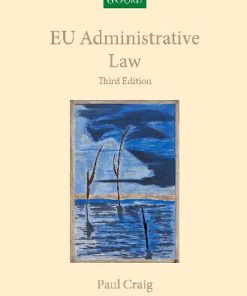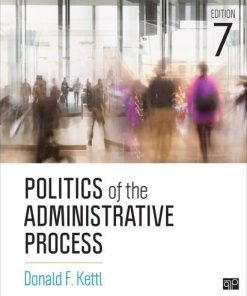(Ebook PDF) Boards of Appeal of EU Agencies Towards Judicialization of Administrative Review 1st edition by Merijn Chamon 0192665979 9780192665973 full chapters
$50.00 Original price was: $50.00.$25.00Current price is: $25.00.
Boards of Appeal of EU Agencies: Towards Judicialization of Administrative Review 1st edition by Merijn Chamon – Ebook PDF Instant Download/DeliveryISBN: 0192665979, 9780192665973
Full download Boards of Appeal of EU Agencies: Towards Judicialization of Administrative Review 1st edition after payment.

Product details:
ISBN-10 : 0192665979
ISBN-13 : 9780192665973
Author : Merijn Chamon
While the EU agencies that have been granted the power to adopt binding decisions are a diverse group, they at least share one feature: in all of them an organisationally separate administrative review body, i.e. a board of appeal, has been established. The review procedures before these boards must be exhausted before private parties can seize the EU courts and the boards therefore all fulfil a similar function: filtering cases before they end up before the courts and providing parties by expert-driven review. Sharing this common function as well as some common features, the boards of appeal of the different agencies remain heterogenous in their set up and functioning. This raises a host of questions from both a theoretic and practical perspective which this volume analyses in depth: how do the boards function, which kind of review do they offer, and how should they be conceptualized in the EU’s overall system of legal protection against administrative action? To answer these questions, the volume’s first part presents a series of case studies, covering all the EU boards of appeal currently in existence, while a second part looks into the horizontal issues raised by the phenomenon of the boards of appeal.
Boards of Appeal of EU Agencies: Towards Judicialization of Administrative Review 1st Table of contents:
1. Between Added Value and Untapped Potential: The Boards of Appeal in the Field of EU Financial Regulation
1.1 Introduction
1.2 The Joint Board of Appeal and the Appeal Panel: Main Features
1.2.1 Establishment and composition
1.2.2 Competences of and procedures before the JBoA and the AP
1.3 The Body of Decisions Adopted by the JBoA and AP
1.3.1 General information
1.3.2 The incremental clarification of the scope and intensity of the reviews of the JBoA and AP
1.3.2.1 The interpretation of the appeals presented before them
1.3.2.2 The notion of challengeable act
1.3.2.3 The requirements of direct and individual concern
1.3.2.4 The threshold for suspension
1.3.2.5 The intensity of review exercised by the JBoA and AP
1.3.2.6 The power of the JBoA and AP to remit cases
1.4 The Way Forward
1.5 Conclusion
2. The Boards of Appeal of Networked Services Agencies: Specialized Arbitrators of Transnational Regulatory Conflicts?
2.1 The specificities of networked services agencies and their reflections on the functioning of BoAs
2.2 The autonomy and impartiality of BoAs: formal guarantees and potential risks
2.3 The competences of the BoAs and their growing proceduralization
2.4 The actual exercise of the competences of the BoAs
2.5 The scope of the review exercised by the ACER BoA
2.6 The standard of control by the ACER BoA: beyond limited review of complex technical issues
2.7 Exploring the full potential of specialized administrative review
2.8 Conclusion: an administrative appeal for arbitrating transnational regulatory conflicts?
3. The Trailblazers: The Boards of Appeal of EUIPO and CPVO
3.1 Introduction
3.2 Background
3.2.1 Factual background
3.2.2 Legal background
3.3 Composition and independence
3.3.1 Composition
3.3.2 Independence
3.4 Appeal proceedings
3.4.1 Reviewable acts and exclusions
3.4.2 Appeal procedure
3.4.3 Scope and intensity of review
3.4.4 Powers of the Board of Appeal
3.4.5 References to earlier decisions taken on appeal
3.5 Relationship with the General Court
3.5.1 Standard and intensity of review
3.5.2 Power to alter the decision of the Boards of Appeal
3.5.3 Role of the General Court
3.6 Role and function of the Boards of Appeal
3.6.1 Review and filtering functions
3.6.2 Guiding function
3.7 Conclusion
4. The Board of Appeal of the European Chemicals Agency at a Crossroads
4.1 Introduction
4.2 The legal framework for the ECHA BoA
4.2.1 The competence of the ECHA BoA
4.2.2 The composition of the ECHA BoA
4.2.3 The parties before the ECHA BoA
4.2.4 The procedure in the appeal before the ECHA BoA
4.2.5 The role of the ECHA BoA and the use of precedent
4.3 The review conducted by the ECHA BoA
4.3.1 The review by the BoA according to the ECHA BoA
4.3.2 The scope of the review of the BoA according to the Court
4.3.3 Intensity of review of the BoA according to the Court
4.3.4 The review of the ECHA BoA decisions by the General Court
4.4 Conclusion
5. The EASA Board of Appeal in Search of Identity: An Effective Filter between Administration and Courts?
5.1 Introduction
5.2 The design of the EASA BoA
5.3 The functioning of the BoA
5.3.1 The competence of the BoA
5.3.2 The legal effects of the decisions of the BoA
5.4 The relationship between administrative and judicial review
5.4.1 Substantive review
5.4.2 Procedural review
5.5 The added value of the EASA BoA. A first assessment
5.6 Conclusions
6. Hidden Administrative Review in EU Law: The BoAs of EU Agencies in the Common Foreign and Security Policy
6.1 Introduction
6.2 The EU agencies established on a CFSP legal basis
6.3 The BoAs of EU agencies
6.4 The BoAs of EU agencies in the CFSP
6.4.1 European Defence Agency (EDA) Appeals Board
6.4.2 European Union Satellite Centre (SatCen) Appeals Board
6.4.3 European Union Institute for Security Studies (EUISS) Appeals Board
6.4.4 Western European Union (WEU) Appeals Board
6.5 The BoAs of EU agencies within the CFSP: A dismissal failure
6.5.1 Secondary law attempting to halt judicial review
6.5.2 Composition, qualifications, and independence
6.5.3 Reforms to the Statute of the Court
6.5.4 Abolishing the Boards of Appeal (and the agencies)
6.6 Conclusion
7. Frontex: Great Powers but No Appeals
7.1 Introduction
7.2 A ‘super-agency’ with fragmented accountability issues
7.3 The complaint mechanism of Frontex
7.3.1 Whose complaints?
7.3.2 Whose assessment and which follow-up?
7.3.3 The remedies?
7.4 The ‘serious incident reporting system’
7.5 Conclusions
8. The Boards of Appeal as Hybrid Adjudicators: On Some Shortcomings of Article 58a of the Statute of the Court of Justice of the European Union
8.1 Introduction
8.2 Legal regime of the BoAs set up within the EUIPO, CPVO, ECHA, and EASA
8.2.1 The BoAs of EUIPO and the CPVO
8.2.2 The BoAs of ECHA and EASA
8.3 Article 58a of the Statute of the CJEU
8.4 Questions regarding the scope of the 2019 reform
8.5 Specific problems raised by Article 58a
8.5.1 Problems that could be solved by the General Court
8.5.2 Possible legislative corrections
8.6 Conclusion
9. Rethinking the Position of the Boards of Appeal from a Comparative Perspective
9.1 Introduction
9.2 The hybrid nature of BoAs as a legal problem
9.3 Administrative pre-trial procedures within Europe as benchmark
9.3.1 Introduction
9.3.2 UK tribunal system
9.3.2.1 Origin and function
9.3.2.2 Institutional design
9.3.2.3 Scope and standard of review
9.3.2.4 Remedies and relations with the ordinary courts
9.3.2.5 Conclusion
9.3.3 Intra-administrative objection procedure
9.3.3.1 Origin and function
9.3.3.2 Institutional design
9.3.3.3 Scope and standard of review
9.3.3.4 Remedies and relations with the administrative courts
9.3.4 Conclusion
9.4 Repositioning the BoAs
9.4.1 Position before the reform of Article 58a
9.4.2 Position after the reform of Article 58a
9.4.3 How to proceed from here?
9.5 From BoAs to specialized tribunals
9.5.1 Independence
9.5.2 Assessment framework
9.5.3 Remedies
9.6 Conclusion
10. Who Litigates before the Boards of Appeal?
10.1 Aims of this chapter and methodology
10.2 General features of administrative review mechanisms
10.2.1 Changing role in connection to the judicial protection
10.3 Variables
10.4 Selection criteria
10.4.1 The agencies and BoAs selected in the sample
10.4.1.1 CPVO BoA
10.4.1.2 ECHA BoA
10.4.1.3 The JBoA of the ESAs
10.4.2 Timeframe and nature of the decisions
10.5 Appellants
10.6 Interveners
10.7 Outcome of appeals
10.8 Grounds for pleas
10.9 Concluding remarks
11. The Position of Boards of Appeal: Between Functional Continuity and Independence
11.1 Introduction
11.2 Functional continuity and independence: a conceptual framework
11.2.1 A narrow understanding of ‘functional continuity’ and its compatibility with the principle of independence
11.2.2 A broad understanding of ‘functional continuity’ and its troubled, yet not impossible, relation with the principle of independence
11.3 The degree of independence of the BoAs of EU agencies: a general overview
11.3.1 Functional independence
11.3.2 Personal independence
11.3.3 Financial independence
11.3.4 Appointment of the members of the Boards
11.3.5 Removal of members of the Boards
11.4 From an administrative to a judicial litigation? Assessing Germany v ECHA
11.5 BoAs of EU agencies in transition: enhancing their independence, respecting their peculiarity
11.5.1 Some caveats before tackling a reform of the institutional position of the Boards
11.5.2 The main arguments in favour of such a reform and its scope
11.6 Conclusion
12. Judicial and Extra-Judicial Review: The Quest for Epistemic Certainty
12.1 Introduction
12.2 Epistemic uncertainty and the different types of discretion
12.3 The evolution of judicial and extra-judicial review in response to epistemic uncertainty
12.4 Procedural model: a silent arbiter or an active inquisitor?
12.5 Uncertainty on trial before the EU Courts
12.5.1 Keeping science at arm’s length
12.5.2 Judges learning economics … and avionics?
12.6 The Boards of Appeal: review or second-guessing?
12.6.1 The limits of the legalization of science
12.6.2 Reviewing expert ‘gut feeling’
12.7 Conclusion
13. Boards of Appeal of EU Agencies and Article 47 of the Charter: Uneasy Bedfellows?
13.1 Introduction
13.2 The applicability of Article 47 of the Charter to Boards of Appeal
13.2.1 The administrative nature of the Boards of Appeal
13.2.2 The inapplicability of the right to an effective judicial remedy to the Boards of Appeal
13.2.3 An administrative remedy cannot replace a judicial remedy
13.3 The contribution of Boards of Appeal to the effectiveness of the right to an effective remedy of Article 47 of the Charter
13.3.1 The procedural safeguards applicable to the Boards of Appeal
13.3.2 Boards of Appeal in support of the effectiveness of judicial protection
13.4 Administrative remedy as a precondition for judicial remedy and Article 47 of the Charter
13.5 Conclusion
People also search for Boards of Appeal of EU Agencies: Towards Judicialization of Administrative Review 1st:
boards of appeal euipo
eu board of appeal
boards of appeal committee
boards of appeal
boards of appeal epo
Tags:
Boards of Appeal,EU Agencies,Towards Judicialization,Administrative Review,Merijn Chamon
You may also like…
Erotica - Fiction
Computers - Home Computer User & Beginner
Engineering - Electrical & Electronic Engineering
Jurisprudence & Law - Foreign & International Law
Jurisprudence & Law - Constitutional Law
Politics & Philosophy
Jurisprudence & Law - Constitutional Law
EU Law Beyond EU Borders: The Extraterritorial Reach of EU Law 1st Edition












